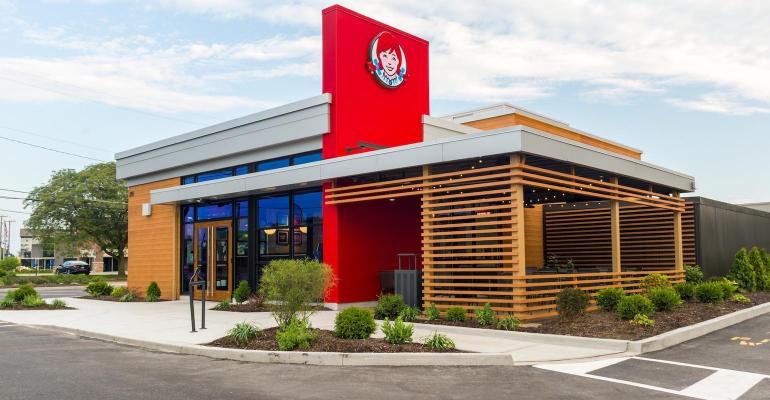The Wendy's Co., which a year and a half ago said delivery kitchens could reach 700 units, is pulling back significantly on those plans and relying on development of traditional units with higher average unit volumes, executives said Wednesday.
“We do not envision that delivery kitchens will be a large element of our growth trajectory moving forward,” said Todd Penegor, Wendy’s CEO, on a fourth-quarter earnings call Wednesday. “We believe our efforts are better spent driving more access to the Wendy's brand through our global next-gen design.”
In August 2021, Dublin, Ohio-based Wendy’s and Miami-based Reef Technology agreed to a deal that called for 700 delivery kitchens over five years in the United States, Canada and the United Kingdom. Penegor said in August that the program would be scaled back.
The delivery kitchens do have a presence in the United Kingdom, where Wendy’s had 29 restaurants at the end of 2022, including 16 with Reef, one traditional franchised unit and the remainder company owned, Penegor said.
Testing and learning from non-traditional units remains important to Wendy’s, he said, “to make sure that we continue to move the brand forward and have more access to our brand. We've learned a lot on all of those … but our focus is really shifting to that traditional freestanding restaurant moving forward.”
Wendy’s opened more than 275 restaurants in 2022, growing net units by 2.1%, Penegor said. “We continue to believe that QSR is the place to be and that our mix of convenience, affordability and speed put us in a position to win with our customers and drive further expansion,” he said.
Gunther Plosh, Wendy’s chief financial officer, said the company this year expected “a tailwind as our incremental investment in breakfast advertising will step down to approximately $2 million this year as our investment in the U.S. breakfast business has ended as planned.” The breakfast program was introduced in 2020.
“We still only have about a third of our rest-of-day customers that have tried our breakfast business,” Penegor said, “so that's an opportunity to really entice the rest-of-the-day customers and that strength of business to come back into the breakfast daypart.”
Penegor said the brand had opportunities to drive speed of service at lunch and dinner as well as to capitalize on the late-night and p.m.-snacking categories.
“We're taking a holistic approach to looking at how we're driving same-restaurant sales,” with the breakfast daypart being part of the calculation, Penegor said.
A new grill, called the DSG 2.0, has been introduced to more than 1,000 restaurants, he added. “We continue to roll that out across the system,” he said, adding that it cuts the burger cooking time in half.
The company is also trying to push more transactions into mobile ordering, including a partnership with Google to test both voice and vision artificial intelligence. “We got some live testing in our restaurant here in the greater Columbus area that we're taking a lot of learnings from,” Penegor said, “and we're very encouraged by the early work that we're seeing on that.”
Penegor said international development of the Wendy’s brand remains a pillar of growth for the company, expanding its Canadian and U.K. markets and planning entries into Ireland and Spain in 2024. The company intends to grow in Mexico and has commitments in India and The Philippines. “Additionally,” he added, “we have begun the franchise recruiting process in Australia, which we plan to enter and expand through a franchise-only model in the coming years.”
On Feb. 16, Wendy’s board approved a plan to redesign the company’s organizational structure to increase efficiency and streamline decision making. As a result of the redesign, the company expects to hold its general and administrative expense in 2023 and 2024 relatively flat vs. 2022. The company said it expects to incur total costs of $11 million to $13 million related to these savings, of which about 85% is expected to be cash expenditures.
For the fourth quarter ended Jan. 1, Wendy’s net income was $41.3 million, or 19 cents a share, down from $52.1 million, or 24 cents a share, in the same period last year. Revenues were up to $536.5 million from $473.2 million in the prior-year quarter.
The company said the revenue increase resulted primarily from higher sales at company-operated restaurants driven by the favorable impact of the acquisition of 93 franchise-operated restaurants in Florida during the fourth quarter 2021 and higher same-store sales. Revenues also benefited from an increase in franchise royalty revenue and advertising funds revenue.
Same-store sales growth was 6.4% systemwide with increases of 5.95% in the United States and 9.9% internationally.
Wendy's, founded in 1969, has about 7,000 restaurants worldwide.
Contact Ron Ruggless at [email protected]
Follow him on Twitter: @RonRuggless





